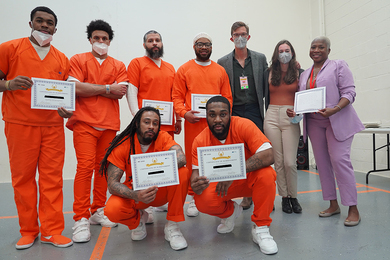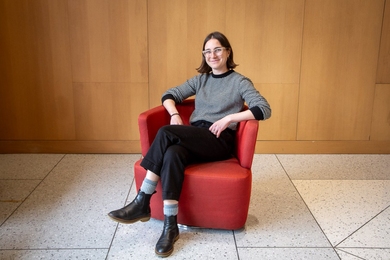A petition signed by more than 500 MIT graduate students and letters from President Charles M. Vest to two key US senators helped focus national attention on a House bill that would wipe out the tax exemption on graduate-school tuition vouchers.
President Vest followed up the letters with a personal visit to Capitol Hill last week, during which he discussed the issue with many of the key players.
The bill, sponsored by Rep. Bill Archer (R-TX), chair of the House Ways and Means Committee, would eliminate a section of the tax code that has granted the waiver. The Senate did not eliminate the provision, Sec. 117(d), from its version of the tax bill.
A joint Senate and House committee was formed last week to reconcile the two bills. Meanwhile, Congressional opposition to the House bill developed, partly in response to the campaign by students across the country. US Rep. Richard E. Neal (D-Springfield), Rep. James McGovern (D-Worcester) and others wrote letters to their colleagues, enlisting their support in the battle against the changes. Rep. McGovern also wrote directly to President Clinton. Rep. Joseph Kennedy (D-Boston) scheduled a press conference today to protest the proposed changes in the tax law.
The MIT student campaign was coordinated by Sam Liu, a PhD candidate in economics, and Sanith Wijesinghe, a master's degree candidate in the Department of Aeronautics and Astronautics. Mr. Liu and students from other universities were scheduled to tell their stories at the Kennedy press conference.
Mr. Liu learned about the proposed tax change via e-mail from a graduate student at Yale. At first, he shrugged off the news. "I didn't think it affected me," said Mr. Liu, who describes himself as "mostly apolitical." His attitude changed dramatically after he calculated his own taxes. "They could go from $1,000 to $5,000," he said. "I figured I'd better do something."
That marked the birth of an activist.
Mr. Liu, working with Mr. Wijesinghe and other members of the Graduate Student Council, organized the petition drive and coordinated a letter-writing campaign. Mr. Wijesinghe wrote the petition.
"Being an international student, I was first hesitant to do anything," said Mr. Wijesinghe, who is from Sri Lanka. "After realizing the potential impact this bill could have, I discussed the issue at a GSC meeting and brain-stormed ideas on how best to increase awareness amongst graduate students. A petition seemed the best idea, so I began compiling information for a petition letter and started making posters to publicize the petition drive."
Students who signed the petition received an information packet containing the telephone numbers of key Congressmen and senators, examples of possible tax increases and summaries of the most recent developments.
"I was amazed how many students had no knowledge about the tax bill and was very pleased I could contribute to help spread the word," Mr. Wijesinghe said. "I learned more about the US political system during that one week than I did during the whole year I've been here."
Other schools join in
Mr. Liu personally called several Congressmen, among them Rep. Archer, and encouraged his peers to use the phone as well to protest the change. He also conferred with graduate students at universities across the country, including the University of Pennsylvania, Stanford and Princeton.
Students at Johns Hopkins asked Mr. Liu for advice on how to launch their own campaign. The National Association of Graduate Professional Students (NAGPS), using e-mail and the Internet, alerted students across the country and urged them to join the campaign. It awakened a generally indifferent constituency.
"Graduate students usually don't vote," Mr. Liu said. "They don't care about political things. We don't usually take up issues." This was different; it was personal. The e-mail chain was swift and effective. Congress was flooded with calls and letters.
"It's been very exciting, tiring and kind of crazy," said Mr. Liu, a 23-year-old Princeton graduate from Washington Crossing, PA. "It's also kind of cool to write one letter and know that thousands are reading it."
Members of the MIT faculty supported the graduate students' campaign, among them Professor Robert G. Weinberg of biology who wrote to Sen. Edward M.������������������Kennedy (D-Mass.).
The proposed House changes in the tax code would reduce the ranks of graduate students "at the same time that our country desperately needs their talents," said Professor Weinberg, who is also a member of the Whitehead Institute.
Senior Associate Dean Isaac M. Colbert made the same������������������point in an interview. "I have to think the authors of this bill did not consider the long-range implications," said Dean Colbert, who heads the Graduate Education Office. "I hope a compromise bill returns the tax-free status. That would be in the best interests of the nation."
The MIT students' petition was forwarded to John C. Crowley, director of the MIT Washington office, which distributed them to the appropriate senators and representatives, including all members and key staff of the Massachusetts delegation. The petition's cover letter said, in part:
"The tuition waiver granted by MIT for graduate teaching and research assistants is what makes 'graduate school' a viable opportunity for all of us. Including tuition fees as taxable income in the new legislation will no doubt drive many of us away from research and teaching������������������
"This tax proposal is a dramatic step in the wrong direction.
"As graduate students we feel betrayed and shocked. The new provisions will make graduate school unaffordable to millions of Americans throughout the next decade. We urge you to represent our views in the Congress by working against the new legislation which eliminates Subsection 117(d) of the IRS code. We ask you to vote for������������������provisions which are more friendly to our education and the future of the nation."
President Vest's letter, written to Sens. Daniel P. Moynihan (D-NY) and William V. Roth Jr. (R-DE), chair of the Senate Finance Committee, thanked them for the support their bill provided for higher education and asked for their help in retaining 117(d).
"The House proposal will impose substantial tax liabilities on students, many of whom already incur substantial debt en route to their educational goals, and it will create a significant additional financial barrier to graduate education," President Vest wrote. "I strongly encourage you to resist the House proposal to phase out subsection 117(d)."
Now that his activist nature has been aroused, Mr.������������������Liu plans to������������������remain politically vigilant. Noting that his family hails from Taiwan and that many of his relatives still live there, he vows to monitor relations with China. He remembers the advice he received from an aide to Sen. Edward M. Kennedy (D-MA): "You can make a big difference."
For additional information, see the Web site at <http://web.mit.edu/activities/gsc/Tax/tax.html>.
A version of this article appeared in MIT Tech Talk on July 16, 1997.





